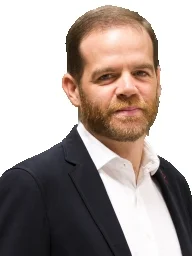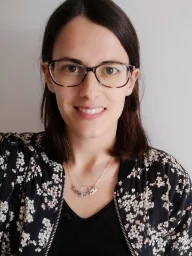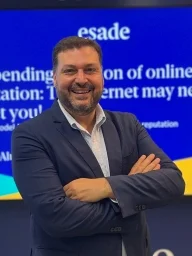Carlos Moedas (European Commission), at ESADE: "Open innovation is at odds with the growth of inequality"
“Openness in the fields of science, innovation and research must now become a declaration of principles for Europe, commented Carlos Moedas, European Commissioner for Research, Science and Innovation, at the World Open Innovation Conference (WOIC). This event – the world’s largest conference in the field of open innovation – brought more than 240 scholars and industry leaders together at ESADE.
During his remarks, Mr. Moedas argued that the two world wars were examples of the negative consequences that can arise from closure policies. Today, he stressed, “the world is not divided between left and right, but between proponents and opponents of openness. Mr. Moedas insisted that “we must promote open innovation on the grounds that the concept is “directly at odds with the growth of inequality. He encouraged the adoption of policies to regulate and promote the open-innovation ecosystem and to ensure that “open innovation becomes a reality in the digital world. Mr. Moedas urged industry leaders and academics to cultivate closer relationships with politicians in order to promote innovation in the legislative world. “We cannot legislate without you, he concluded.
Over the course of the two-day event, leading academics hosted by ESADE presented more than 60 studies and reflected on how to apply their findings to improve and transform companies in eight real-life cases. Leaders in the field of open innovation shared innovation-related experiences and challenges with their academic counterparts in order to forge connections between academia and the real-life business world.
Alberto Prado, Vice President and Head of Digital Acceleration at Philips, discussed the ways in which digital platforms can be used to make advances in the field of open innovation: “At Philips, we are conducting a massive transformation. We used to sell hardware – physical products – but now we are clearly committed to software and digital innovation. We’ve gone from a transactional economy to offering value propositions. Mr. Prado acknowledged that “digital innovation is more volatile before adding: “The only way to protect yourself in this area is to continually innovate so that you can always be first.
Digital innovation in the health sector
Mr. Prado described Philips’s efforts to develop HealthSuite, a new platform for innovation in the health sector. “The health sector is changing radically, he explained. “We are seeing a shift from specific, fragmented treatments to integrated, continuous treatment, where users are more proactive and greater emphasis is placed on preventive medicine. The only way to solve the challenges presented by this continuum, which begins with the promotion of a healthy lifestyle, it is to share data in all processes while also guaranteeing user privacy. Through the new platform, Mr. Prado explained, Philips hopes to “improve the lives of three billion people by 2025.
The FC Barcelona style of play: an open innovation ecosystem
During a panel discussion on the FC Barcelona style of play as a source of innovation, Iván Bofarull, Director of Innovation and Strategic Initiatives at ESADE, described the late Johan Cruyff as “the Steve Jobs of football in his coaching role. “In the 1970s and 1980s, Barça had players like Maradona and Cruyff himself – the best in the world – but the team’s performance was mediocre, commented Mr. Bofarull. “But as a coach, Cruyff was a disruptive genius who managed to create not only a winning team but also a beautiful, enjoyable style of play, which became a hallmark of the club.
Mr. Bofarull compared the arc of Cruyff’s career with the three key stages of the innovation process: “There was the Cruyff era, the unique product of a genius; then there was the post-Cruyff era, during which his legacy endured; and then there was the neo-Cruyff era, the current period, the longest winning stretch in the history of FC Barcelona. During this period, thanks to the work of Guardiola and some of his predecessors, Cruyff’s style has re-emerged and what was once a unique product has been transformed into a genuine innovation ecosystem, where each successive new coach can innovate on the basis of what came before. The club has gone from intuition to systematisation, and this encoding is what makes it possible for the innovation process to endure over time.
Open innovation in China
George Yip, Professor at Imperial College London and at China Europe International Business School (CEIBS), commented: “The innovative ecosystem in China is growing exponentially. China has gone from being a follower of external innovation processes to offering some of the most innovative products on the market, including clear examples like Huawei, which has become a leader in its sector and an example to follow at the international level, as well as for other Chinese companies. Prof. Yip noted that Huawei “spends at least 10% of its revenue on R&D.
Xiaolan Fu, founder of the Technology and Management Centre for Development at the University of Oxford, highlighted the possibilities presented by the flow of knowledge over the Internet. She stressed the importance of opening innovation processes in areas such as scientific research. Prof. Fu also highlighted international cooperation efforts in the field of innovation as one of the major business opportunities in today’s world.
Contributing to collective intelligence by opening up innovation processes
This year, the WOIC was held in Europe for the first time. The conference was organised by Henry Chesbrough, Professor in the Department of Operations, Innovation and Data Sciences at ESADE. Prof. Chesbrough is known for coining the term open innovation to describe a new trend in business innovation, in which companies open up their innovation processes, universities and research centres offer them real-life solutions, and the companies, in turn, commercialise their innovation processes or use technologies and processes designed by other companies.
The WOIC also featured the participation of high-profile figures such as Francesca Bria, Chief Technology and Digital Innovation Officer at Barcelona City Hall. Ms. Bria commented that “Barcelona and innovation go hand in hand and observed that the city is becoming a “hub for digital innovation. Chef Ferran Adrià, who was also in attendance, commented: “Cooking is the means by which I have been able to conduct research with creativity and innovation.




